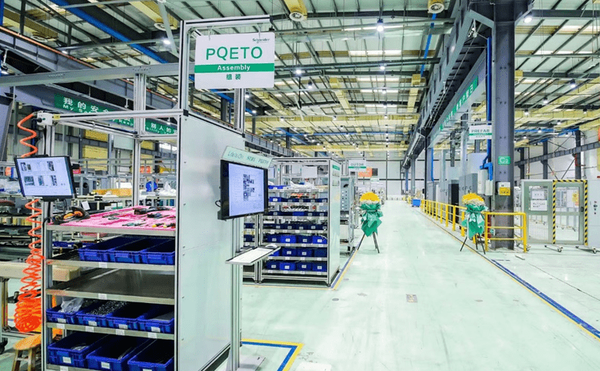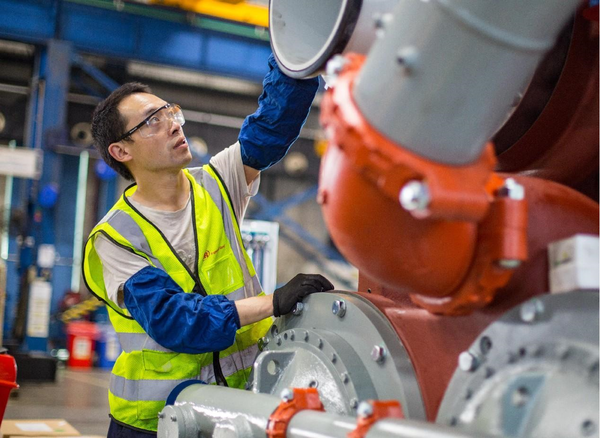By Luo Shanshan, Wang Yongzhan, People's Daily
Foreign-funded companies have remained upbeat about the development prospects in China, continuously expanding their presence in the country since the beginning of this year.
Recently, a set of new-generation digital power quality equipment rolled off the production line at a factory of Schneider Electric in Xiamen, southeast China's Fujian province. A new flexible production line also started operation at the factory.
China has become Schneider Electric's second-largest market in the world, as well as an important supply chain base and one of the four major research and development (R&D) bases of the company.
In Chengdu, southwest China's Sichuan province, European aircraft manufacturer Airbus has been orderly promoting its first aircraft lifecycle service project outside Europe.

In 2023, an important task for China is to make greater efforts to attract and utilize foreign investment. By properly shortening the negative list for foreign investment access, continuing to build a first-class business environment, providing better services for foreign-funded enterprises and facilitating business cooperation and exchanges, China has constantly promoted high-level opening up and improved the quality and level of trade and investment cooperation.
On the first day of 2023, the 2022 edition of the Catalogue of Encouraged Industries for Foreign Investment went into effect. This version contains 1,474 items, with 239 newly-added items and 167 revised ones compared with the 2020 version.
Foreign companies investing in the included industries can enjoy favorable policies such as tax reduction and exemption, as well as priority in land supply.
More encouraged industries for foreign investment and a less negative list for its access have indicated China's ongoing efforts to attract foreign investment.
In recent years, China has continuously lowered the threshold for foreign investment. Items on the negative lists nationwide and for pilot free trade zones (FTZs) have been cut to 31 and 27, respectively. Opening up has been basically achieved in the manufacturing sector and steadily promoted in the agricultural and service industries.

Nowadays, the service industry has become a major sector that attracts foreign investment to China.
The State Council recently released a circular, approving the launch of a pilot project to expand opening up the service sector in six cities, including Shenyang, Nanjing, Hangzhou, Wuhan, Guangzhou and Chengdu.
The pilot project had previously been carried out in five places including Beijing, Tianjin, Shanghai, Hainan and Chongqing. Nearly 70 innovative policies have been rolled out in Beijing in areas including R&D of the sci-tech sector and financial services for the real economy, and 151 differentiated pilot measures have been launched in four places including Tianjin, accelerating the opening up of the service sector.
Thanks to the pilot project launched in Chongqing and other projects such as the Chongqing and the China-Singapore (Chongqing) Demonstration Initiative on Strategic Connectivity, ICHAM Pte. Ltd., a Singaporean company, obtained a license for conducting Qualified Domestic Limited Partner (QDLP) business in Chongqing and set up a wholly-owned subsidiary in the city.
"By obtaining the license, we can carry out financing activities in China and invest in Singapore and other overseas markets. In 2023, we'll actively conduct business and build a two-way cross-border channel for financing and investment between China and the international market," said Chen Peiliang, president of the subsidiary.
The annual Central Economic Work Conference recently proposed to grant foreign-funded enterprises national treatment, guarantee equal participation of foreign-funded enterprises in government procurement, bidding, and standard setting in accordance with the law, and increase the protection of intellectual property rights and the legitimate rights and interests of foreign investors.
The foreign investment law, which came into effect on Jan. 1, 2020, is China's fundamental law in the area of foreign investment. It sets out unified requirements for the access, promotion, protection and management of foreign investment.
Long Guoqiang, deputy head of the Development Research Center of the State Council, pointed out that China has abolished laws, regulations and normative documents that ran counter to the foreign investment law for three consecutive years, and has carried out the formulation, revision and abolition of over 500 documents. This effort will be continued in the future, Long said.

"We officially kicked off the project only more than 6 months after signing the letter of intent. The Chinese government significantly improved the efficiency of services," said Hu Yongdong, an executive from Airbus, mentioning the complex aircraft lifecycle service project that involves multiple business sectors.
Hu expressed that to push forward the project, departments from Sichuan province and Chengdu city were proactively engaged in matchmaking, actively enhanced coordination, and innovated cooperation models, greatly relieving financial pressure on the company in advancing the project.
An official from China's Ministry of Commerce expressed that the country will continue to enhance investment facilitation and ramp up support for foreign investors, solve problems in the operation and construction of projects, and provide greater convenience for foreign investors in carrying out trade and investment activities in China.
The energetic Chinese economy has delivered enormous opportunities for foreign-funded companies, said Yin Zheng, executive vice president of Schneider Electric.


